
Imago
Image via Eagle team

Imago
Image via Eagle team
The Eagles’ cheerleading team will look different this season, and not just because of new choreography. For the first time, the squad will include three men: rookies Dalton Walsh and Alex Fan, alongside James LeGette, who has been part of the group since 2021. LeGette enters his fifth season, giving the Eagles one of the most visible male contingents in the league.
Watch What’s Trending Now!
They’re part of a larger shift across the NFL. This year, 71 men will be cheerleaders on 11 different teams, a number that reflects the slow but steady dismantling of old stereotypes. For Walsh, Fan, and LeGette, the role is as much about athleticism and precision as it is about breaking barriers. Their presence on the sideline signals not just a change in numbers, but a change in perception.
ADVERTISEMENT
Meet the Eagles’ male cheerleaders
For rookie Alex Fan, the path to the NFL began long before he ever stepped onto the Eagles’ sideline. Growing up in Bakersfield, California, he dedicated himself to dance at the Civic Dance Center and Mallory Dance Academy, training for years before surviving a four-round audition to land his dream spot. Now balancing ambitions of becoming a lawyer with his professional dance career, Alex says being part of a team with multiple men is special: “It’s really been a pleasure to be on a team that has multiple boys where we can fall back on each other.” His background as both a dancer and an advocate shows how he blends artistry with purpose.
Dalton Walsh arrives with a different story. A Deptford, N.J. native and Saint Joseph’s University graduate in marketing and analytics, he built a career as a choreographer, instructor, and coach while living with Tourette’s Syndrome. Rather than letting it limit him, Dalton has been open about the challenges and how dance became his outlet. He leans on routines like hot yoga and workouts to stay grounded, while mentoring younger dancers in local studios and high schools. His message is simple: resilience is as much a part of performance as choreography.
Top Stories
Michael Strahan Confirms Stance on Retirement from FOX While Announcing Future Plans
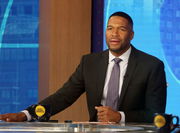
NFL Legend Charles Tillman Opens Up on Resigning From FBI After Unethical ICE Raids
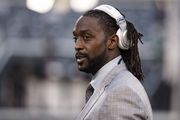
Josh Allen Officially at Risk of Losing 21 Players as Bills Coach Quits Hours After Joe Brady Announcement
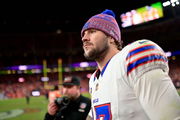
Terry Bradshaw Makes Personal Announcement Amid Calls for Retirement After On-Air Mistake on FOX
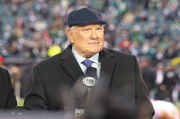
Dak Prescott Officially at Risk of Losing 15 Players After Jerry Jones Fires Three Cowboys Coaches
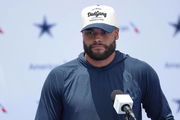
Philadelphia Eagles cheerleaders Dalton Walsh, James LeGette and Alex Fan shared a message of support this week for their NFL colleagues and fellow male cheerleaders: “I would say keep dancing…”https://t.co/Y2yC9CeBVv
— Good Morning America (@GMA) August 20, 2025
ADVERTISEMENT
Then there’s James LeGette, the veteran of the group. Now in his fifth season, the Philadelphia native brings tumbling passes and gymnastics to game days, but his influence extends further. A special education teacher and mentor at the Boys & Girls Club, James is dedicated to inspiring the next generation. What started as a dare in middle school became a passion that continues to grow, and his longevity reflects his commitment both on and off the field. “Being able to be a part of something that includes you no matter what you look like or what you bring to the table is absolutely amazing,” James said. Alongside Fan and Walsh, he now forms the largest group of male cheerleaders in Eagles history.
ADVERTISEMENT
Why are NFL teams using an inclusive approach to cheerleading?
The addition of male cheerleaders in the NFL is more than a symbolic gesture. For LGBTQ+ athletes especially, their presence serves as a reminder that visibility matters. In a sport long associated with rigid traditions, seeing men on the sidelines signals that the game is evolving. Sure, it’s slow, but it’s one for the future. Where young athletes can see themselves represented not just on the field, but in every part of the spectacle.
Traditionally, NFL cheerleaders were almost exclusively women, their roles framed as supporting acts rather than athletic careers. That perception is now being disrupted. With about a third of NFL teams already incorporating men into their squads, inclusivity is gradually becoming the norm. The Eagles’ decision to expand their male cheer roster only underscores a wider movement: redefining cheerleading as a sport of athleticism, endurance, and artistry rather than reinforcing outdated gender lines.
For some performers, like Minnesota’s Blaize Shiek, it’s about being a role model. Showing kids that their passion can have a place in the most traditional corners of American sports. Of course, progress rarely arrives without resistance. Social media backlash, including homophobic comments from high-profile figures, reflects the challenges these performers still face. Yet the resilience of cheerleaders like Shiek, who defiantly responded to harassment with his viral “See you at 3” post, captures the heart of this shift.
ADVERTISEMENT
ADVERTISEMENT
ADVERTISEMENT
ADVERTISEMENT
.png)
.png)
.png)



